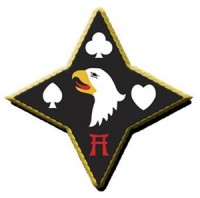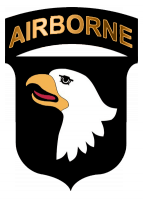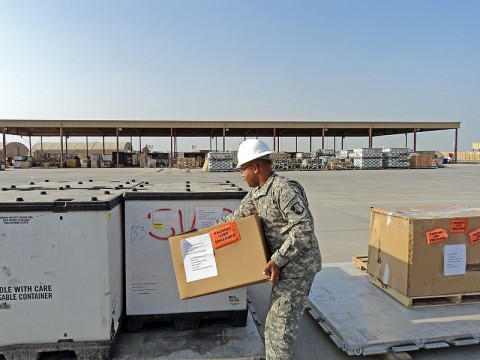Written by Spc. Michael Vanpool
101st Sustainment Brigade, 101st Airborne Division (AA) Public Affairs

 Bagram Airfield, Afghanistan – There’s no Walmarts in Afghanistan.
Bagram Airfield, Afghanistan – There’s no Walmarts in Afghanistan.
Picking up the bullets, vehicle parts, lumber isn’t as easy as driving down the street with a shopping list and a credit card.
When the 101st Sustainment Brigade needs supplies for the thousands of servicemembers it supports in Afghanistan, the liaison office in Kuwait makes sure the Lifeliners equipment never dwindles.

“The LNO is the eyes and ears for the brigade,” said Sgt. Maj. Jennifer Love, the Kuwait liaison office sergeant major for the 101st Sust Bde.
Communication is the key to mission completion. The Kuwait LNO works with Support Operations and the brigade command team here in Afghanistan, and they feed them all the information during Logistics Synchronization meetings and Battle Update briefs many times a week, Love said.
“We expedite any type of cargo or personnel, for example, equipment or [Supply Support Agency] parts,” said Staff Sgt. Karla Tyson, the ground movement coordinator noncommissioned officer in charge for the Kuwait LNO. She recently moved to Afghanistan with the transportation section for the brigade SPO. “If the parts the brigade needs were in Kuwait, then we would expedite them instead of working with a third party. If you have a liaison, then you can work the change of command and get what you need quickly.”
During constant communication across the two countries, the two groups discuss incoming mine resistant ambush-protected vehicles and material handling equipment vehicles. They also work together to expedite and prioritize ammunition and manage containers throughout Kuwait and Afghanistan.
“We would communicate a lot to make sure we’re all on the same sheet of music,” Tyson said. “We make sure that what they are tracking is what we’re tracking.”
The Kuwait LNO includes just a handful of Lifeliners, so they rely on learning each other’s jobs to push cargo to the brigade.
“We have to know how to do ammo, supply, we’re all cross trained,” Tyson said. “When someone went goes on R&R [rest and recuperation leave], we’d have to pick up the slack.”
The team works closely together knowing their work and decisions impact thousands of servicemembers in the fight in Afghanistan.
“They’re not thinking about themselves,” Love said, “they’re thinking about the war fighters and the ammo, MRAPS and everything else they need. It means a lot to know we’re affecting what’s going on in the battlefield.”
From making sure pallets of ammo were ready for shipment to making the right number of vehicle parts are on hand to scheduling an airplane, the Kuwait LNO worked closely with each other for seamless mission completion.
“If it wasn’t for the team coming together as a team, it would all fall apart,” Love said. “The most important part of a deployment is building relationships.”
While the hours are long, the sandstorms inevitable, the work seemingly overloading, the small team pushed through it all so that the service members in FOBs throughout Afghanistan don’t go without what they need.
“The people are doing this wholeheartedly and selflessly,” Love said. “It’s a lot of work, but it’s all in God’s favor. There would be nothing without God’s favor.”


